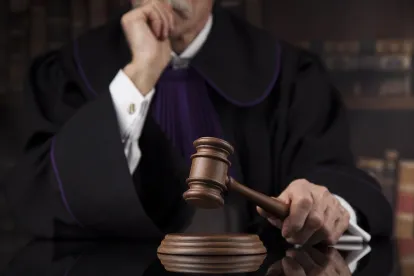Holding
In Performance Chemical Company v. True Chemical Solutions, LLC, No. W-21-CV-00222-ADA (W.D. Tex. May 21, 2021), Judge Albright of the Western District of Texas found that True Chemical Solutions (“True Chem”) violated the Court’s discovery order in bad faith and caused substantial prejudice to Performance Chemical Company (“PCC”). The district court granted PCC’s motion for sanctions against True Chem and dismissed the case.
Background
PCC filed suit alleging that True Chem infringed PCC’s patented Automated Water Treatment Trailers, or frac trailers. Id. at 2. Throughout the litigation, a key issue was whether True Chem automated its frac trailer by using a programmable logic controller (“PLC”) to automate the pumps within the trailer.
During discovery, PCC requested that its expert be allowed to inspect a True Chem frac trailer, which True Chem resisted. Id. The Court ordered True Chem to allow the inspection. When PCC expressed concern that True Chem would present an incomplete trailer for inspection, the Court specifically ordered that the inspection be of a trailer that was complete and included all relevant components. Id. at 3.
In response to the Court’s order, True Chem produced trailers for inspection. However, when PCC inspected the trailers, it found no PLC automation device, even though the trailers were manufactured to be capable of automation. Id.
PCC also tried to ascertain from True Chem’s employees in depositions whether True Chem’s frac trailers were automated. Under oath, True Chem employees repeatedly testified that True Chem did not automate frac trailers by installing a PLC. Id. Due to these representations, PCC could only rely on circumstantial evidence to prove its infringement theories regarding automation. Id. at 4.
After the close of discovery and in response to a court-ordered document search, True Chem produced more than 50,000 new documents. Id. Those documents contained information appearing to show that third-party automation companies had been retained by True Chem to automate its frac trailers. Id. PCC deposed representatives of these third-party companies, which confirmed that, in 2019, True Chem had hired a third party to install a PLC on frac trailersand that those PLC devices were still mounted the last time the third-party company interacted with the trailer. Id. at 5. The PLC device in question was large and would have required considerable effort to install and maintain. Id. PCC argued, and the Court agreed, that removing it from a trailer would have required considerable effort. Id.
True Chem did not dispute that the third-party company installed a PLC on frac trailers but, unsurprisingly, disputed the implication that it removed the PLC device specifically to dodge discovery.
Legal Standard
Under the Federal Rules of Evidence, a court may issue sanctions against a party who “fails to obey an order to provide or permit discovery.” Fed. R. Civ. P. 37(b)(2)(A). One of the sanctions allowed by Rule 37 is “rendering a default judgment against the disobedient party.”
The Fifth Circuit requires a finding of bad faith or willful conduct for the severest sanctions under Rule 37, such as striking pleadings, dismissing a case, or rendering default judgment. Additionally, before dismissing a case for discovery abuse, the Fifth Circuit requires that several factors be met. The factors include: (1) that the violation of the discovery order be attributable to the client instead of the attorney; (2) that the violating party’s misconduct must cause substantial prejudice to the opposing party; and (3) a finding that less drastic sanctions would not be appropriate. Performance Chemical Co., No. W-21-CV-00222-ADA (W.D. Tex. May 21, 2021), at 2 (citing FDIC v. Conner, 20 F. 3d 1376, 1380-81 (5th Cir. 1994)).
First Factor: Violation of the Discovery Order be Attributable to the Client Instead of the Attorney
The Court found that True Chem committed discovery violations with a pattern of “contumacious conduct and delay.” The Court issued a specific order that True Chem make all components in its custody or control, whether attached to trailers or not, available for inspection.
A True Chem employee testified that the company did not employ automation—even though True Chem had received an invoice for the automation project. Id. at 6. True Chem had not produced the PLC, or even notified counsel of the PLC’s existence, or taken steps to amend pleadings, supplement interrogatories, or notify opposing counsel or the Court, until a year later. Id. at 7. In fact, it was only after PCC subpoenaed a third-party company that it could determine the nature of the invoices and discover the PLC device. It was only 154 days after the close of discovery as part of a 50,000-piece document dump that True Chem produced invoices pertaining to the allegedly non-existent automation. Id. at 4, 7. Even then, True Chem still had not turned over the PLC device for inspection.
The Court found that, for a full year, True Chem stonewalled production of the PLC device. This led the Court to determine that the first factor, violation of the discovery order, was attributable to True Chem.[1]
Second Factor: Violating Party’s Misconduct Must Cause Substantial Prejudice to the Opposing Party
The Court found that PCC was forced to incur unnecessary attorneys’ fees and discovery costs as a result of the misconduct of True Chem and its counsel. Specifically, PCC was forced to engage in thorough and extensive third-party discovery, including up to the week before trial, when True Chem finally disclosed the PLC device. Id. at 8.
True Chem tried to use its failure for its own gain by arguing that, since PCC forced disclosure by True Chem of the PLC project, PCC had to limit its timeframe for damages. Id. at 8-9. The Court rejected that argument, stating that it “cannot understand why any attorney would attempt to use its own blatant discovery violations as a sword to argue that the opposition must limit its properly pleaded claims.” Id. at 9.
The Court found that True Chem’s actions caused substantial prejudice to PCC, preventing PCC’s “timely and appropriate preparation for trial.” Therefore, the Court found that the second factor was satisfied.
Third Factor: Less Drastic Sanctions Would Not be Appropriate
The Court held that the third factor was satisfied because True Chem demonstrated “flagrant bad faith and callous disregard of its responsibilities.” Id. at 9. Specifically, the Court found that had it not been for the diligent comb through of 50,000 documents at the eleventh hour, the continuous and lengthy egregious conduct of the case would have gone undiscovered. Id. at 10.
Since all three prongs were satisfied, the Court held that it was only adequate to sanction True Chem with a “death-penalty sanction,” and that anything less would not provide sufficient deterrence from similar behavior in other cases. Id. at 10.
The Court granted PCC’s motion for sanctions and struck True Chem’s non-infringement defense and invalidity counterclaims. The Court further found that True Chem willfully infringed the asserted patents, ordered that True Chem be permanently enjoined from continuing its infringing activity, and that PCC be awarded its attorneys’ fees.
Further Developments
On June 7, 2021, PCC moved for entry of a damages award of $16.9M (representing treble lost profits through 2019 ($5.6M) plus prejudgment interest ($0.6M)) and attorneys’ fees. PCC argued no damages trial was necessary for a number of reasons: the Court’s inherent powers in connection with its sanctions ruling, the status as a default case with no party entitled to a jury trial on damages, the fact that PCC’s evidence conclusively established lost profits, and the fact that True Chem’s damages expert’s opinions had been struck “in their entirety.”
On June 15, 2021, Judge Albright granted True Chem’s attorneys’ motion to withdraw from the case.
Takeaways
While this case may seem like an outlier, it is important to remember that litigation is supposed to be a fair fight. Each side should timely disclose any relevant documents during discovery and adhere to any Court orders to allow trial to proceed in a timely manner and to prevent undue burden on the opposing party. Flagrantly disrespecting these principles may lead to an unforgiving response by the court.
The same is true in patent prosecution. The duty of good faith and candor set forth in Rule 56 is supposed to guarantee that patents are procured in a fair and timely proceeding that avoids placing an undue burden on the USPTO. As prosecution counsel, you should ask hard questions, which here would have involved questions regarding possible public use or sale. The prosecutor should consider asking those questions in writing. And if the patent prosecutor has suspicions of untruthful statements or other misconduct by the applicant, withdrawal from prosecution may be the best move.
[1]Note that on March 25, 2021, PCC seems to have argued TrueChem’s counsel was also complicit. According to a Law360 article, in PCC’s Response in Opposition to True Chemical Solutions LLC’s Motion to Strike Scott Weingust’s Expert Report (sealed), “PCC replied that True Chem’s response highlighted for the first time that True Chem’s former attorneys . . . were ‘complicit’ and that they made things worse in the two months since they were informed of the misconduct.” Hu, Tiffany, “Chemical Co. Wants to Skip IP Damages Trial After Sanctions,” Law360, June 16, 2021. Although Judge Albright only assigned responsibility to True Chem and not its counsel, in the sanction order he commented, “it is worth noting that True Chem’s counsel . . . knew of the existence of the automation project on January 20, 2021, two months before such information was revealed to PCC.” See Order, FN1, (emphasis in original). Also, “PCC located invoices that were either concealed or overlooked as the result of willful incompetence on the part of the attorneys and then had to engage in third-party discovery to determine the nature of the invoices. Id. at 7.





 />i
/>i

